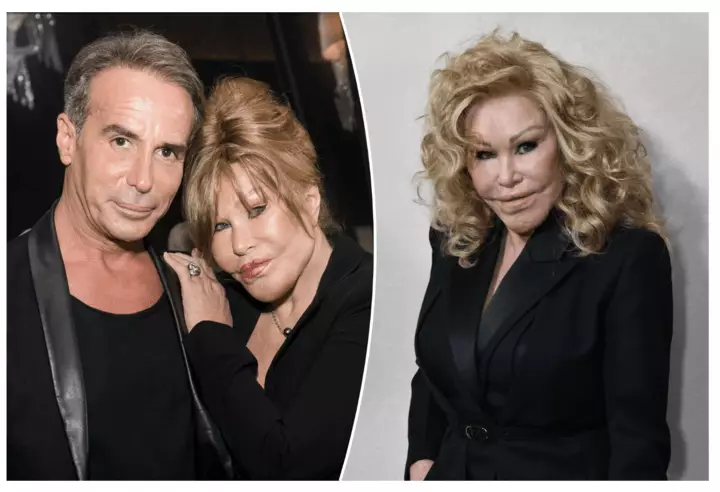Jocelyn Wildenstein, a name that reverberates through the annals of celebrity culture, has long been stigmatized by the moniker “Catwoman.” Often perceived as a mere product of excessive cosmetic surgery, her legacy is enshrouded in ridicule rather than respect. Following her recent passing, the heartbreak of her fiancé, Lloyd Klein, has brought forth a defense of her character, highlighting that she deserves compassion rather than scorn. Klein’s insistence that Wildenstein was not destitute at her death illuminates the complexities of her life, revealing a narrative far more intricate than mere financial decline or obsession with appearance.
Despite the sensational stories that have surrounded her, Klein asserts that Wildenstein was a woman of substance and vibrance, deserving of dignity. He passionately recalls how she was the love of his life and how deeply he misses her. This brings into perspective the human behind the public facade generated by the media, showcasing a poignant reminder that even the most scrutinized figures have personal histories filled with love, pain, and purification.
Throughout her life, Wildenstein faced tumultuous financial challenges that were often blown out of proportion by public perception. While she gained a remarkable settlement of $2.5 billion from her divorce in 1999, the financial narrative took a sharp turn post-2015 when her ex-husband’s family cut off her annual payments. Many outlets reported her as being broke, but Klein’s recollections contradict these claims, asserting that she may have been asset-rich but cash-poor due to the complicated nature of her dealings.
The irony of Wildenstein’s situation lies in the disparity between her perceived wealth and her actual financial freedom. Even as she boasted significant assets, her expenses—stemming from a glamorous lifestyle and mounting debts—encumbered her financial viability. Klein’s remarks about a fraudulent painting affecting her trust reaffirm how subjectivity in the art market can alter fortunes, overshadowing the nuances of Wildenstein’s financial narrative and further complicating her already delicate position.
Wildenstein’s relationship with her appearance was perhaps her most debated attribute. Dismissed by many as a woman obsessed with plastic surgery, Klein claims she experienced ridicule rather than understanding for her aesthetic choices. Initially asserting her unique looks stemmed from her Swiss heritage, Wildenstein eventually acknowledged her surgical enhancements, suggesting a complex relationship with societal beauty standards.
Klein explains that Wildenstein was unflinching in her pursuit of beauty, yet the motivations behind her appearance often go unacknowledged. The media tends to isolate her physical transformation from her identity, labeling her as merely a spectacle. In private, Klein remembers sharing laughs over the public’s misconceptions, demonstrating that behind the exaggerated media portrayal exists a real person capable of humor and self-acceptance. This dichotomy between public perception and individual experience emphasizes how external judgments can overshadow a person’s internal reality.
Jocelyn’s story is not devoid of familial strife. Her children, Diane and Alec Jr., reportedly distanced themselves in recent years, a theme often echoed in narratives of those who achieve a certain level of fame. Klein’s observations following Wildenstein’s death reveal a strained relationship intertwined with love, loss, and the shadow of public expectation. His reflections illuminate how her motherhood was defined by care and generosity, irrespective of the estrangement that ensued.
As Klein prepares for her funeral, the juxtaposition of Wildenstein’s genuine love for her children with their apparent estrangement serves as a chilling reminder of how fame can fracture family ties. Yet, the poignant memories of shared adventures and a nurturing spirit reveal that her maternal influence transcended her public image, granting insights into the real impact of her life and choices.
Lloyd Klein’s memories of Jocelyn provide a rarity in celebrity correspondences — a genuine portrayal untainted by fame’s allure. As he recounted their time together, the love bloomed amid extravagant experiences, underscoring that love goes beyond financial complexities and public personas. The intimate moments shared, especially during their last days in Paris, resonate as a testament to their bond. He offers a compassionate farewell that fights against the prevailing narrative, labeling Wildenstein as misunderstood rather than mocked.
In death, Jocelyn Wildenstein’s legacy glimpses the intricate layers of a life defined not solely by her appearance but by her resilience and capacity for love. The multitude of experiences—both joyful and melancholy—draw a picture far more vibrant and authentic than the caricature presented in popular culture. As we unravel her reality, we come to understand that beneath the glamor lies a story marked by strength, family, and ultimately, the human spirit’s desire to be respected for who one truly is.
